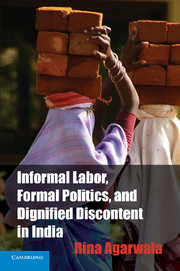Book contents
- Frontmatter
- Contents
- List of Tables
- List of Figures
- Acknowledgments
- Abbreviations
- 1 Introduction
- 2 Struggling with Informality
- 3 The Success of Competitive Populism
- 4 Communism's Resistance to Change
- 5 The Minimal Gains of Accommodation
- 6 Conclusion
- Appendix I Photos of Informal Workers in Construction and Bidi
- Appendix II The Evolution of the Count of Informal Workers
- Appendix III Interview Methodology
- References
- Index
Appendix III - Interview Methodology
Published online by Cambridge University Press: 05 March 2013
- Frontmatter
- Contents
- List of Tables
- List of Figures
- Acknowledgments
- Abbreviations
- 1 Introduction
- 2 Struggling with Informality
- 3 The Success of Competitive Populism
- 4 Communism's Resistance to Change
- 5 The Minimal Gains of Accommodation
- 6 Conclusion
- Appendix I Photos of Informal Workers in Construction and Bidi
- Appendix II The Evolution of the Count of Informal Workers
- Appendix III Interview Methodology
- References
- Index
Summary
For this study, I conducted two sets of interviews. The first set of interviews with government officials and labor leaders served two purposes: they supplemented the dearth of secondary information on India's informal workers’ organizations, and they provided qualitative data on the relationship between the state and informal workers from above. Questions to politicians focused on how and why government officials justify their attention to informal workers’ needs. These interviews were crucial to testing my hypothesis on the effects of state economic policy and electoral contexts on the success or failure of informal workers’ movements.
The second set of interviews included 140 women workers who were members of an informal workers’ organization in the construction and bidi industries. These interviews provide insights on how informal workers’ view and define their own struggles, as well as information on how they relate to state officials and attempt to gain state attention from below. I analyzed the answers from informal workers alongside answers from government officials to provide a clearer picture of state–worker relations.
- Type
- Chapter
- Information
- Publisher: Cambridge University PressPrint publication year: 2013



